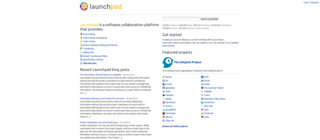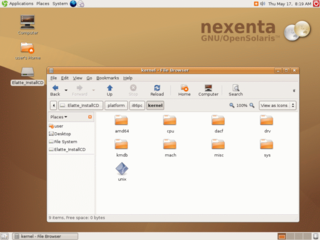Related Research Articles

A Linux distribution is an operating system made from a software collection that includes the Linux kernel, and often a package management system. Linux users usually obtain their operating system by downloading one of the Linux distributions, which are available for a wide variety of systems ranging from embedded devices and personal computers to powerful supercomputers.

GNOME Evolution is the official personal information manager for GNOME. It has been an official part of GNOME since Evolution 2.0 was included with the GNOME 2.8 release in September 2004. It combines e-mail, address book, calendar, task list and note-taking features. Its user interface and functionality is similar to Microsoft Outlook. Evolution is free software licensed under the terms of the GNU Lesser General Public License (LGPL).

IntelliJ IDEA is an integrated development environment (IDE) written in Java for developing computer software written in Java, Kotlin, Groovy, and other JVM-based languages. It is developed by JetBrains and is available as an Apache 2 Licensed community edition, and in a proprietary commercial edition. Both can be used for commercial development.

Ubuntu is a Linux distribution based on Debian and composed mostly of free and open-source software. Ubuntu is officially released in multiple editions: Desktop, Server, and Core for Internet of things devices and robots. All of the editions can run on a computer alone, or in a virtual machine. Ubuntu is a popular operating system for cloud computing, with support for OpenStack.
NX technology, commonly known as NX or NoMachine, is a remote access and remote control computer software, allowing remote desktop access and maintenance of computers. It is developed by the Luxembourg-based company NoMachine S.à r.l.. NoMachine is proprietary software and is free-of-charge for non-commercial use.
A source-code-hosting facility is a file archive and web hosting facility for source code of software, documentation, web pages, and other works, accessible either publicly or privately. They are often used by open-source software projects and other multi-developer projects to maintain revision and version history, or version control. Many repositories provide a bug tracking system, and offer release management, mailing lists, and wiki-based project documentation. Software authors generally retain their copyright when software is posted to a code hosting facilities.

Launchpad is a web application and website that allows users to develop and maintain software, particularly open-source software. It is developed and maintained by Canonical Ltd.

Nexenta OS, officially known as the Nexenta Core Platform, is a discontinued computer operating system based on OpenSolaris and Ubuntu that runs on IA-32- and x86-64-based systems. It emerged in fall 2005, after Sun Microsystems started the OpenSolaris project in June of that year. Nexenta Systems, Inc. initiated the project and sponsored its development. Nexenta OS version 1.0 was released in February 2008.
In computer security, executable-space protection marks memory regions as non-executable, such that an attempt to execute machine code in these regions will cause an exception. It makes use of hardware features such as the NX bit, or in some cases software emulation of those features. However, technologies that emulate or supply an NX bit will usually impose a measurable overhead while using a hardware-supplied NX bit imposes no measurable overhead.

In the 1950s and 1960s, computer operating software and compilers were delivered as a part of hardware purchases without separate fees. At the time, source code, the human-readable form of software, was generally distributed with the software providing the ability to fix bugs or add new functions. Universities were early adopters of computing technology. Many of the modifications developed by universities were openly shared, in keeping with the academic principles of sharing knowledge, and organizations sprung up to facilitate sharing. As large-scale operating systems matured, fewer organizations allowed modifications to the operating software, and eventually such operating systems were closed to modification. However, utilities and other added-function applications are still shared and new organizations have been formed to promote the sharing of software.
IcedTea is a build and integration project for OpenJDK launched by Red Hat in June 2007. IcedTea also includes some addon libraries: IcedTea-Web is a free software implementation of Java Web Start and the Java web browser applet plugin. IcedTea-Sound is a collection of plugins for the Java sound subsystem, including the PulseAudio provider which used to be included with IcedTea. The Free Software Foundation recommends that all Java programmers use IcedTea as their development environment.
Progress Chef is a configuration management tool written in Ruby and Erlang. It uses a pure-Ruby, domain-specific language (DSL) for writing system configuration "recipes". Chef is used to streamline the task of configuring and maintaining a company's servers, and can integrate with cloud-based platforms such as Amazon EC2, Google Cloud Platform, Oracle Cloud, OpenStack, IBM Cloud, Microsoft Azure, and Rackspace to automatically provision and configure new machines. Chef contains solutions for both small and large scale systems.

Ubuntu One is an OpenID-based single sign-on service operated by Canonical Ltd. to allow users to log onto many Canonical-owned Web sites. Until April 2014, Ubuntu One was also a file hosting service and music store that allowed users to store data "in the cloud".
A delta update is a software update that requires the user to download only those parts of the software's code that are new, or have been changed from their previous state, in contrast to having to download the entire program. The use of delta updates can save significant amounts of time and computing bandwidth. The name "delta" derives from the mathematical science use of the Greek letter delta, Δ or δ to denote change.
Brackets is a source code editor with a primary focus on web development. Created by Adobe Inc., it is free and open-source software licensed under the MIT License, and is currently maintained on GitHub by open-source developers. It is written in JavaScript, HTML and CSS. Brackets is cross-platform, available for macOS, Windows, and most Linux distributions. The main purpose of Brackets is its live HTML, CSS and JavaScript editing functionality.

RStudio is an integrated development environment for R, a programming language for statistical computing and graphics. It is available in two formats: RStudio Desktop is a regular desktop application while RStudio Server runs on a remote server and allows accessing RStudio using a web browser. The RStudio IDE is a product of Posit PBC.

OpenZFS is an open-source implementation of the ZFS file system and volume manager initially developed by Sun Microsystems for the Solaris operating system and now maintained by the OpenZFS Project. It supports features like data compression, data deduplication, copy-on-write clones, snapshots, and RAID-Z. It also supports the creation of virtual devices, which allows for the creation of file systems that span multiple disks.
Besides the Linux distributions designed for general-purpose use on desktops and servers, distributions may be specialized for different purposes including computer architecture support, embedded systems, stability, security, localization to a specific region or language, targeting of specific user groups, support for real-time applications, or commitment to a given desktop environment. Furthermore, some distributions deliberately include only free software. As of 2015, over four hundred Linux distributions are actively developed, with about a dozen distributions being most popular for general-purpose use.